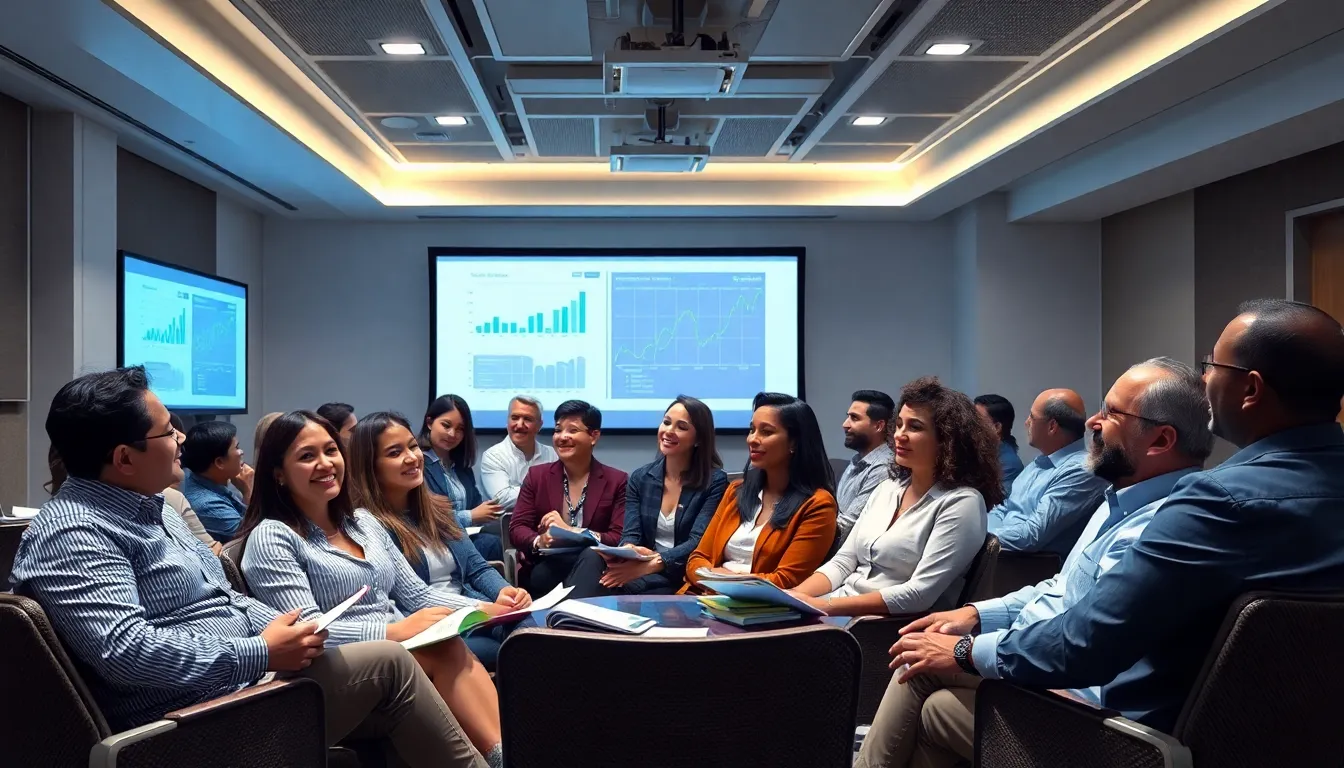In a world where money seems to disappear faster than socks in a dryer, financial education seminars are like a GPS for your wallet. They promise to turn financial confusion into clarity, helping individuals navigate the often-treacherous waters of budgeting, investing, and saving. Imagine finally understanding what those mysterious terms like “compound interest” and “asset allocation” really mean—no more pretending to know while nodding along!
Financial Education Seminars
Financial education seminars provide participants with essential knowledge regarding personal finance. These events focus on various topics, including budgeting, investing, and saving strategies. Attendees often benefit from expert insights that clarify complex financial concepts. Understanding terms like compound interest and asset allocation becomes straightforward in this supportive environment.
Numerous organizations offer such seminars to cater to different audiences. Schools, community centers, and financial institutions frequently host these programs. Participants also engage in discussions that promote sharing personal experiences and advice. Learning through interaction makes grasping financial principles more relatable.
Seminars vary in format and duration, accommodating diverse preferences. Some events occur over a few hours, while others extend to multiple sessions. Participants choose the structure that best fits their schedules and learning styles. Many seminars incorporate hands-on activities, enhancing retention of knowledge.
Certified financial planners often lead these events to ensure accuracy and reliability. Their expertise adds credibility to the information shared. Furthermore, attendees can pose questions, receiving personalized guidance that helps them apply concepts to their financial situations.
Data indicates that individuals who attend financial education seminars are more likely to implement sound financial practices. A study showed that participants reported increased savings and better budgeting habits shortly after the seminars. Consequently, these seminars serve as vital tools for promoting financial literacy and empowering attendees to take control of their financial futures.
Benefits of Attending Financial Education Seminars

Attending financial education seminars offers numerous advantages that contribute to better money management. These benefits range from improving financial literacy to enhancing networking opportunities.
Improved Financial Literacy
Financial education seminars significantly enhance participants’ understanding of key financial concepts. While attending, individuals grasp essential topics like budgeting, investing, and saving. Clarity becomes a reality when complex terminologies such as compound interest and asset allocation are simplified. Participants learn practical strategies that they can apply immediately to their financial situations. Reports indicate that individuals who attend these seminars often exhibit increased confidence in managing their finances. Enhanced financial literacy empowers them to make informed decisions that lead to effective money management.
Networking Opportunities
Financial education seminars facilitate valuable connections among participants. Meeting like-minded individuals fosters an environment for sharing experiences and insights. Attendees often exchange contact information, leading to ongoing discussions about financial strategies. Connections made during these events can result in mentorship opportunities, providing guidance from more experienced individuals. Engaging with professionals such as certified financial planners occurs regularly, allowing attendees to ask questions and build relationships. Networking not only enhances the learning experience, it creates a community focused on improving financial health.
Types of Financial Education Seminars
Financial education seminars come in various formats, catering to different learning preferences. These events provide invaluable insights into personal finance.
Online Seminars
Online seminars offer flexibility and accessibility, allowing participants to join from anywhere with an internet connection. They typically use interactive platforms, enabling real-time engagement with instructors and fellow attendees. Many online sessions cover topics such as budgeting, retirement planning, and debt management. Attendees benefit from recorded sessions, allowing for review of material at their own pace. Expert speakers often share valuable resources through downloadable materials, enhancing the overall learning experience. Research shows participants are likely to adopt improved financial practices after engaging in virtual settings.
In-Person Workshops
In-person workshops create opportunities for hands-on learning and direct interaction with instructors. Participants often find these environments ideal for asking questions and clarifying concepts in detail. Many workshops include discussions on investment strategies, credit management, and estate planning. Networking plays a crucial role, as attendees connect with peers and professionals sharing similar interests. Engaging activities and group exercises reinforce important financial concepts. Statistics reveal that attendees of in-person events report greater confidence in managing their finances compared to those who do not participate.
Key Topics Covered in Seminars
Financial education seminars cover several key topics that enhance participants’ understanding of personal finance. Attendees gain insights into crucial financial principles that can lead to better decision-making.
Budgeting and Saving
Budgeting forms the foundation of effective money management. Participants learn how to create realistic budgets tailored to their incomes and expenses. Interactive exercises allow attendees to practice this skill during workshops. Saving techniques also receive significant attention, with discussions on emergency funds, savings goals, and methods for automating savings. Statistics show that individuals who prioritize budgeting often experience improved financial stability, making this topic a vital component of seminars.
Investment Strategies
Investment strategies are another focal point of financial education seminars. Basics such as understanding stocks, bonds, and mutual funds get introduced, ensuring participants build a solid foundational knowledge. Advanced concepts, including asset allocation and risk assessment, are explored as well. Engaging case studies help illustrate the practical applications of these strategies. Data indicates that individuals who apply learned investment strategies are more likely to see growth in their portfolios over time.
Conclusion
Financial education seminars are essential for anyone looking to enhance their financial literacy. They provide invaluable insights into budgeting investing and saving while demystifying complex concepts. By participating in these seminars individuals gain the confidence and knowledge needed to make informed financial decisions.
Whether through online formats or in-person workshops these events foster a supportive community. Attendees not only learn practical strategies but also connect with experts and peers who share similar financial goals. The benefits are clear as individuals who engage in these seminars often report improved financial management and a greater sense of empowerment.
Investing time in financial education can lead to lasting improvements in one’s financial health. Embracing these learning opportunities is a step towards a more secure and informed financial future.